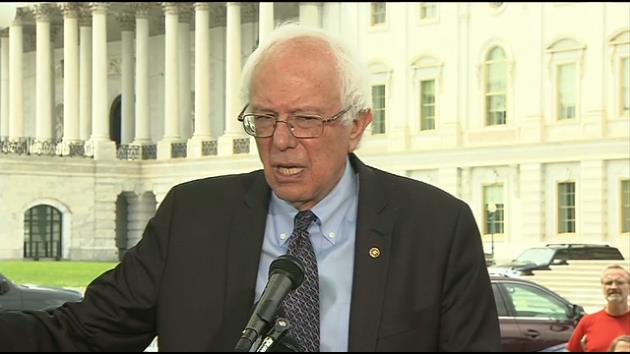By DAVID A. LIEB and LISA LERER
Associated Press
KANSAS CITY, Mo. (AP) – Democratic presidential candidate Bernie Sanders is trying to expand his liberal coalition, intensifying his appeals to the minority voters who twice powered President Barack Obama to the White House.
As a senator representing the overwhelmingly white state of Vermont, Sanders remains fairly unknown among Latino and black voters – key Democratic Party constituencies. It's an electoral problem he hopes to fix in the coming weeks, making plans to introduce himself to minority voters with stops in Phoenix, Houston and the Southern Christian Leadership Conference meeting in Louisiana later this month.
"I want to talk about the stain of racism in this country," he told hundreds of Latino activists gathered for the national conference of the National Council of La Raza on Monday. "America becomes a greater nation, a stronger nation, when we stand together as one people and in a very loud and clear voice, we say 'no' to all forms of racism and bigotry."
His strong statements mark a shift in tone from his early campaign, which has so far made few attempts to raise his profile in minority communities. His kickoff rally on the banks of Lake Champlain in Burlington featured testimonials from a series of white speakers, including the local ice cream makers behind Ben & Jerry's, and made no mention of issues like gun control and racial inequality. Rather than focus on more current criminal justice and gun control issues – like the shooting last month in a Charleston church – Sanders has addressed race relations through the decades-old lens of the civil rights movement and the broader issue of growing income inequality.
"I have a long history in fighting for civil rights," Sanders said in an interview with ABC News last month. "I understand that many people in the African-American community may not understand that."
Facing an increasingly diverse Democratic Party, Sanders' ability to draw on a broader base of support will determine whether he becomes a serious threat to Hillary Clinton, who holds a dominant primary lead, or remains more of a protest candidate for liberal whites. Four in ten self-identified Democratic voters were non-white in 2012, a slight increase from four years earlier, according to a 2013 Gallup analysis.
Clinton has spent months wooing minority voters. She's focused heavily on immigration and criminal justice policy, issues that hold particular resonance in Latino and African-American communities. On Tuesday, she plans to meet with influential groups of black, Asian-Pacific and Latino lawmakers on Capitol Hill.
Speaking in Kansas City on Monday, Clinton emphasized her support for passage of immigration legislation, vowed to expand upon Obama's executive order deferring deportation of people brought to the country illegally as children, and charged Republicans with supporting policies that would not grant undocumented workers a pathway to full citizenship. She described volunteering to babysit the families of Mexican migrant farmworkers when she was about 10 or 11 years old in Illinois.
"I don't have to wait to become president to take a stand right here and right now against the divisive rhetoric that demonizes immigrants and their families," she said. "It's not enough to use language of respect if you refuse to support policies of respect."
Democratic presidential candidate Martin O'Malley touted his work as Maryland governor expanding access to driver's licenses, pushing for legislation on in-state tuition discounts for undocumented college students, and increasing government contracts to Latino businesses. He plans to introduce an immigration plan Tuesday.
"The real symbol of America is not the barbed wire fence," he said. "It is the Statue of Liberty."
Sanders, meanwhile, drew on his own background, noting how his father came to the U.S. from Poland at age 17 without much money, without knowing English and without much of an education. He called on Congress to pass immigration legislation and said Obama's executive order should be expanded to include parents of those who have been living in the country illegally since childhood.
"We are making progress in this country and there will be no turning back," he said to applause. "And let me be very clear in stating this, that no one, not Donald Trump, not anyone else, will be successful in dividing us based on race or our country of origin."
___
Lerer reported from Washington.
Copyright 2015 The Associated Press. All rights reserved. This material may not be published, broadcast, rewritten or redistributed.

